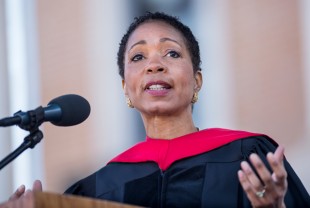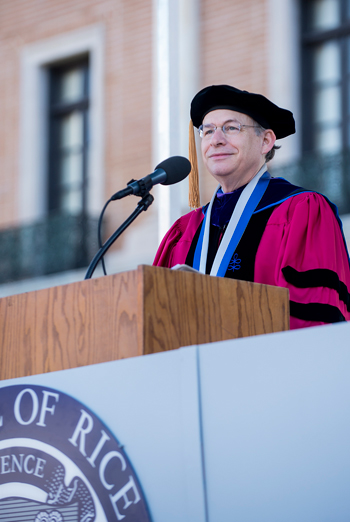CARE USA leader discusses the value of perseverance at Rice commencement

Dr. Helene Gayle, president and CEO of CARE USA, presents the address at Rice's 101st commencement May 17. Photo by Tommy LaVergne
Dr. Helene Gayle, president and chief executive officer of CARE USA, encouraged Rice University graduates to make a difference by persevering to achieve their goals.
Gayle spoke at the university’s 101st commencement May 17.
“As you leave here today and begin your next chapter, I invite you to seek answers to your core central question, about what will give you meaning in life and how you can be a positive force for change in our world,” she said. “I want you to think about what your legacy will be when you return 10, 20, 30 years from now as an alum of this great institution. How will you have followed your passion?”
Rice President David Leebron introduced Gayle, named by Forbes magazine as one of the world’s 100 most powerful women, as well as student speakers Yoonjin Min, past president of the Student Association, and Michael Domeracki, past president of the Graduate Student Association.

Rice conferred degrees during a plenary commencement Saturday morning in the Academic Quad. Photo by Tommy LaVergne
Rice awarded 1,896 degrees, with some students earning degrees in double and even triple majors. The university awarded 986 undergraduate and undergraduate professional degrees, and 910 graduate (master’s and Ph.D.) degrees. This year four separate ceremonies were held Friday to individually recognize the recipients of bachelor’s, master’s, doctoral and business degrees, and then all degrees were conferred during a plenary commencement Saturday morning in the Academic Quad. (See photos of the ceremonies.)
Leebron also announced this year’s winner of an annual award named in honor of the commencement speaker. Colleen Fugate, who majored in sociology and the study of women, gender and sexuality, was presented the Dr. Helene Gayle Commencement Award for Global Women’s Health. (Read more about the award here.)
Gayle joined CARE in 2006 after 20 years at the Centers for Disease Control and Prevention (CDC) and also worked for the Bill and Melinda Gates Foundation.
She said her theme of persistence “reminds me of the many young girls around the world who struggle to gain access to basic education. Most of you have heard, and admire, as I do, of Malala, who’s a champion for speaking up for girl’s education, even though she had to pay a huge price.
“But there are many others. Some of you may remember hearing the news, a couple of years ago, about two sisters in Afghanistan, Atifa and Shamsia. They were walking to school one morning when two men on a motorcycle pulled alongside them.
“One of them asked the girls where they were going. Shamsia told them she was going to school. The man pulled out a plastic squirt gun, aimed it and sprayed acid into their faces. Now, Atifa and Shamsia will probably be disfigured for life and marked by the trauma in other ways. Even so, when asked if she would stop attending school, one of the girls told a reporter that they could spray her 100 more times and she would still go to school.
“She said, ‘Why wouldn’t I want to go to school? I want our country to persevere. I have to do something for my country. I must go to school.’
“Now, that’s perseverance,” Gayle said.
She attributed the same quality to the “hundreds of young Nigerian girls the world is rallying behind right now, kidnapped for simply wanting to learn.
“They’re persevering this very moment, even as we speak. And while we don’t know what the next chapter of their lives will be, I believe these schoolgirls are determined to write their own story, to continue to hope, to dream, to fashion their futures for themselves.”
Gayle shared her strong belief in the power of the individual to affect change.
“It’s impossible to map life out with any precision,” she said. “But I firmly believe that if you want to make a difference, there are a few things that will help you succeed.”
First, she said, the graduates must follow their passions. “Great breakthroughs don’t come about when one is half-hearted. They require people who are invested.”
She advised each graduate to “be true to who you are.” Gayle noted a Harvard Business Review study of leaders found consensus that self-awareness is critical. “Before asking others to follow, a leader must know who she or he is. It can start by just asking yourself some simple questions,” she said. “What are your values? What motivates you?”
Gayle advised the graduates to remain “open to the unexpected.” She said she was influenced as a student by the social activism of the time.
“Back then I did a lot of protesting,” she said. “In fact, it was easy to think that activism was all about being against things. Racism. Sexism. War. Apartheid. Adults. Pantyhose. You name it, I was against it. Particularly when ‘it’ was the government.
“So consider the irony that I later worked for 20 years at the Centers for Disease Control working for that very same federal government.”
It was, she continued, a good decision. “By then, I had realized that a career in public health could be an amazing path for contributing to social change and that there was more power in being for something than against everything.”
In the same light, a career shift to focus on ending global poverty was “the ultimate way to save lives, and coming to CARE gave me a chance to focus on the very issues of inequity and social injustice that had led me to medicine and health in the first place.”
She advised the graduates to “be bold and believe in the possible.”
Help us tell the story of Rice’s 101st commencement. Use #RiceGrad14 in your tweets, pics and posts, and see them here.
She invoked the struggle of Nelson Mandela – “truly one the most remarkable people I had the privilege of meeting” – as an example.
“In 1964, when Nelson Mandela stood before the South African Supreme Court on trial for sabotage, he described his vision for a democratic and free society in which all persons live together in harmony and with equal opportunities,” she said. “He clung to that vision for 27 years in prison — a length of time that would have caused many others to abandon hope — and he led a movement from behind bars.
“Mandela never lost faith that he could help change the world.”
At Friday night’s Bachelor’s Convocation, Leebron told the graduates that as they go out into the world, “we hope you will remain true to yourselves and yet open to what you may become.”
He said the whole purpose of their education at Rice “has not been to finish you as a person, but to give you the curiosity, the tools and the confidence to continue to learn, to question, to explore and to evolve.”
“We hope that in your journeys ahead, you will hold your Rice values dear,” he said, reminding them to be responsible and “to do all that you undertake with the utmost integrity, to participate and contribute to your communities and to pursue all endeavors with the highest aspirations of excellence. This is what we have asked of you here, and that is what we ask as you become alumni of Rice.”
Editor’s note: To view videos of 14 unconventional students from the Class of 2014, click here.
To view the commencement photo galleries, click here.
For a list of the graduates’ awards and honors that were noted in the commencement program, click here.



Leave a Reply